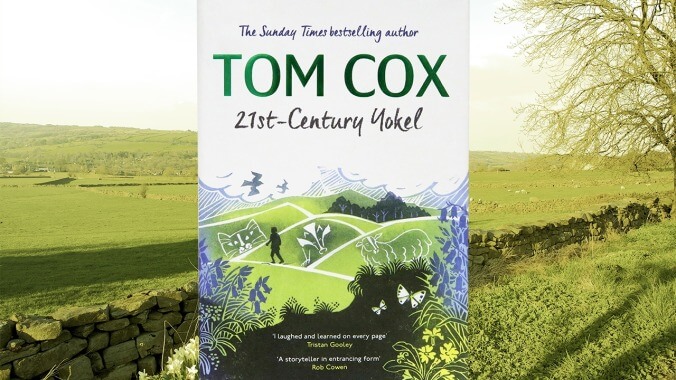Graphic: Nicole Antonuccio. Background photo: David Fettes/Getty Images.
Like a British David Sedaris dedicated to a rural way of life, Tom Cox crafts funny and poignant stories out of observations and interactions—except his observations are of trees and his interactions are with squirrels. The landscape and its non-human inhabitants are the supporting characters to Cox’s countryside tour guide, and he spins them into fully alive entities as only a true nature lover can.
Chapters take unhurried paths to tell stories, an approach in harmony with the content. When Cox writes about scarecrows, he doesn’t just describe a few of the creepier ones stalking the farmlands he walks through; he turns the topic into an evocative treatise on the folk horror of a certain British tradition, weaving in creepy local history, mystical encounters, and the fittingly antiquarian ghost stories of M.R. James. In other words, he takes his time on his subjects, following a path where it leads him, which is almost always somewhere captivating. It doesn’t much matter that as an American reader much of the references and Britishisms go over my head; the tales and their tangents are firmly grounded, even when one flight of fancy leads to another. A typical excerpt finds Cox on a walk, which more often than not is an opportunity to weave through interesting topics, stumble upon tangents, and consider them for subsequent observations:
Above us, further west, a celestial hole opened up in the clouds, shooting rays down over the ancient stone rows of Fernworthy Forest: as good a spot for a bucolic alien landing as there could be in England. In the valley, below, just over a mile away, I spotted the unusually tall, damaged spire of Widecombe church and abandoned my route to run half-right towards it, remember the story Mike, a veteran member of the Dartmoor Search and Rescue Team, had told me about Jan Reynold selling his soul to the Devil there in the autumn of 1638. One of the many commendable facets of selling your soul to the Devil in the seventeenth century was that you’d invariably have to go to a tract of bleak and windswept land to do it properly. Nowadays you can accomplish it far less romantically from the comfort of your own home just by running a corrupt property developing enterprise or writing a hateful column about immigrants or homosexuals for a tabloid newspaper.
It’s a rare pleasure to find a book this decidedly contemplative without being preachy, meditative without being heavy-handed. Cox is a memoirist who lightly sidesteps the pitfalls of memoirs, mostly by turning his attention outward to the bucolic world around him, and inward only when it serves to further illuminate the land he so joyously occupies. He might be misleading readers when he calls himself a yokel; it’s with real savvy the country-dweller unravels the appeal and challenges of rural living. Frequently very funny, sometimes heartfelt and sad, and occasionally bitingly acerbic, 21st-Century Yokel is the uncommon book that makes a convincing case for its particular way of life without ever telling readers how they should live theirs. Cox’s writing style might be described as slow, but in a good way. In a year defined by politically reactive writing that feels urgent—albeit necessary—it’s refreshing just to revel in a slower pace of life, to inhabit the book’s leisurely tenor and style. It’s as rejuvenating as a good country walk.
21st-Century Yokel
is out now in England and available for purchase here. It is available for U.S. preorder here.

